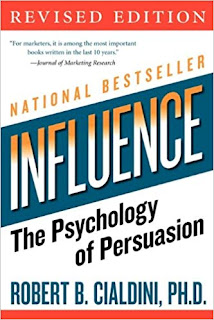This book
is based on participant observation where the
author experienced different jobs/conversations to figure out a key question in
our lives – What is it that makes us comply to certain
requests/people than others? Answer to this question lies in the fact that
our brains are also wired to an algorithm that we develop during our early life
basis experiences/societal teachings. So everything that we do is a ‘Click’ (Stimuli/Trigger) & ‘Whirr’
(Action/Reaction) basis the algo.
Eg.
A mother turkey is very loving and caring. However, this mothering only happens
when chick makes cheep cheep sound and might kill the one which does not.
Similarly, trigger word for us is 'because'. Whenever someone gives a reason
(however illogical it may be) the probability of compliance increases.
The
following principles help us explain the brain wiring. Below is my
interpretation of the book –
- The contrast
principle –
1.
we tend to compare two things/events that occur in series
and enhance/demean the second event basis first
2.
Imagine buying a suit before a shirt. The shirt, even if
it is a costly one for a shirt, seems cheap compared to a suit
- That is exactly why
car dealers upsell the accessories individually (for price contrast with
car) after the car sale is closed
- Rule of
reciprocation –
1.
Much obliged has become a replacement of Thank You
2.
An ancient rule designed for equal exchanges generally
leads to unequal gains
3. Reciprocal arrangements
are so vital in our social system that we feel uncomfortable when beholden
3.
Reciprocal concession –
1.
If a requestor gives a concession on the request, we tend
to comply to his concession
2. Rejection - then -
retreat technique acts on the Contrast Technique as we feel the second offer is
much easier/cheaper and we must do at least this much for a person if we are
unable to comply to his/her initial request
4.
Commitment and consistency –
1.
Once we commit to something (put money on it) we tend to
be more optimistic and confident about the outcome as we feel we have to be
consistent to the commitment.
2.
Chinese used this beautifully on American POW during
Korean War.
3.
Same is the case with organisations running contests
where they ask customers why they like ABC (their product) in 50 words or less.
Public commitment is quite a strong click
4. The tougher the
initiation ceremony, the more lucrative and meaningful we find the groups.
Consider the case of Roadies, the stupid initiation ceremony of verbal/physical
abuse leads people to believe that being a Roadie brings a sense of “Respect”
5.
Social proof –
1.
we tend to deem behaviour as correct depending on social
setting. E.g. Bartender salt their tip jars with a few dollars stimulating us
to think tipping is appropriate behaviour
2.
Waiting period in cars so that we think of a lot of
people think it, it must be correct
3.
And thus the product life cycle adoption chart depicting
major population lies in “Early Majority” & “Late Majority” phases
4. If there is no change in
physical evidence, social evidence has to be changed for compliance. True for
rebranding strategies
- Liking -
1.
We generally tend to comply with a request of someone we
know and like. E.g. Tupperware party as the request comes from a
friend/neighbour. They've mostly shut all retail outlets and have a Tupperware
party start every 2.7 seconds in the US
- Factors to likeness are - physical attractiveness (that is
why sales rep are seen well dressed), similarity (we resonate with
similar ethnic groups etc), compliments (we are phenomenal suckers for
flattery), contact and cooperation, conditioning and association (the
messenger got killed if the news was bad, brand endorsements say
association doesn't have to be a logical one but a positive one)
- Authority –
1.
We rarely agonise over the pros and cons of authority's
demands. This happens mostly because sometimes it is beneficial for us and
other times, they just control our rewards and punishments. E.g. Healthcare. Even
if a doctor makes an error, no one in lower ranks will question the judgement
coz when we don't have to think, we don't
2. The 3 authority symbols
that produce max compliance are titles( we also tend to see size and status as
related), clothes (yet again for sales reps) and trappings of authority
(someone who has not earned a title formally but is perceived as an authority
figure)
8.
Scarcity –
1.
We are more motivated by the thought of losing something
than by thought of gaining something of the same value. E.g. Limited edition
comics, coins
2.
As opportunities become less available we lose our
freedom and we hate to lose our freedom
3.
Competition coupled with scarcity enhances the impact
Very
often in making a decision, we don't use all the relevant information
available. We use, instead, only a single, highly representative piece of the
total.
To use this to your advantage or prevent conceding any unwanted advantage, the only way is to be cognizant of these unconscious biases & rewire your brain with constant feedback!
Do share your views/feedback in the comments section

No comments:
Post a Comment